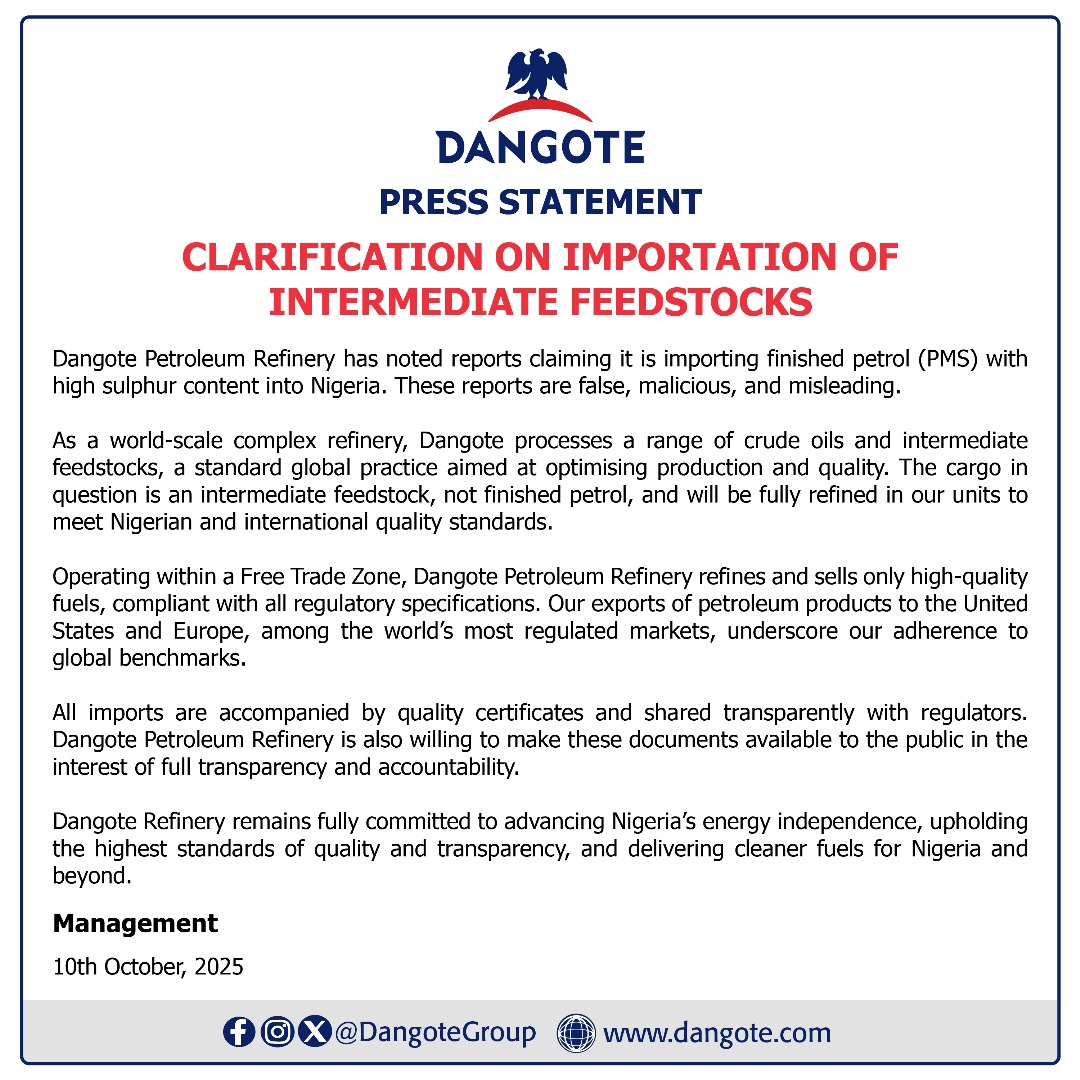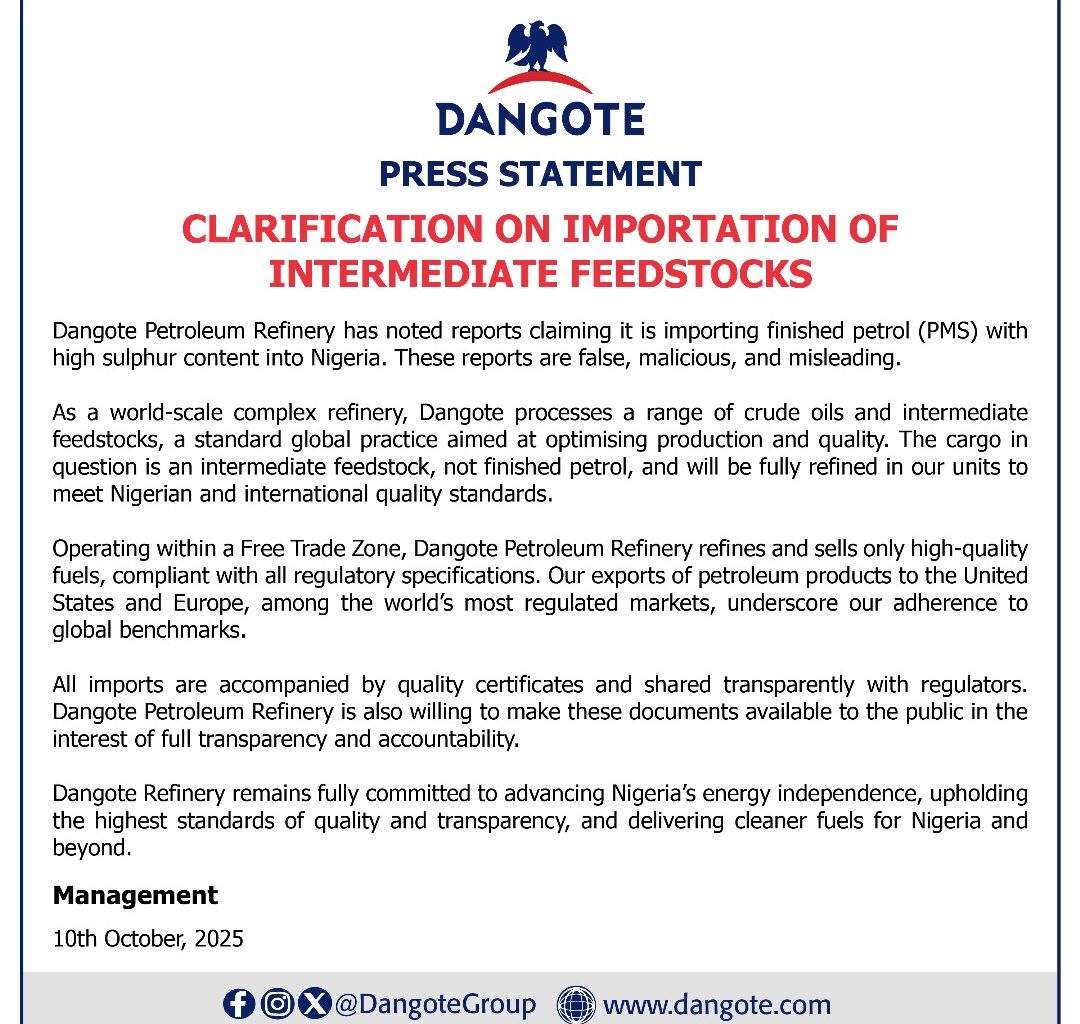Dangote Petroleum Refinery has denied importing finished petrol (PMS) with high sulphur content into Nigeria, describing the claims as false, malicious, and misleading.

In a statement issued on Friday by its management, the refinery clarified that the cargo in question is an intermediate feedstock, not finished petrol.
The company explained that, as a world-scale complex refinery, it processes a range of crude oils and intermediate feedstocks, describing it as a standard global practice designed to optimise production and fuel quality.
The intermediate feedstock will undergo full refining at Dangote’s facilities to meet both Nigerian and international quality standards.
Operating within a Free Trade Zone, Dangote Petroleum Refinery emphasised that it produces and sells only high-quality fuels that comply with all regulatory specifications.
The company highlighted its exports of petroleum products to highly regulated markets, including the United States and Europe, as evidence of adherence to global standards.
It said, “As a world-scale complex refinery, Dangote processes a range of crude oils and intermediate feedstocks, a standard global practice aimed at optimising production and quality.
“The cargo in question is an intermediate feedstock, not finished petrol, and will be fully refined in our units to meet Nigerian and international quality standards.”
“Operating within a Free Trade Zone, Dangote Petroleum Refinery refines and sells only high-quality fuels, compliant with all regulatory specifications. Our exports of petroleum products to the United States and Europe, among the world’s most regulated markets, underscore our adherence to global benchmarks,” it said.
The refinery added that all imports are accompanied by quality certificates, which are shared with regulators. Dangote Petroleum Refinery also expressed willingness to make these documents publicly available to ensure transparency and accountability.
The management reaffirmed the company’s commitment to “advancing Nigeria’s energy independence, upholding the highest standards of quality and transparency, and delivering cleaner fuels for Nigeria and beyond”.
A Certificate of Quality issued by Phillips 66 Limited, operators of the Humber Refinery in the United Kingdom, confirms that a consignment of High-Sulphur Catalytic Gasoline (FCC Gasoline) was loaded for shipment to Dangote Nigeria on September 21, 2025.
The document, numbered MFG-250923-00016 and dated September 23, 2025, details the laboratory test results for the cargo and certifies that the sample analysed was a composite sample taken immediately after loading.
The product was drawn aboard the vessel Clearocean Marigold and tested at the refinery’s accredited laboratory in North Lincolnshire, UK.
The certificate shows that the gasoline, described as “High-Sulphur Cat Gas”, is a light petroleum product typically used as a blending component in the production of finished motor gasoline.
According to the report, the product appeared “clear and bright,” meaning that it was free of water and visible impurities, and its density at 15 °C measured 0.7375 kilograms per litre, which is consistent with normal gasoline grades.
Laboratory analysis indicated that the boiling range of the sample spanned 49 °C to 155 °C, a volatility characteristic of gasoline-range hydrocarbons. Its Research Octane Number (RON) was 92.3 and its Motor Octane Number (MON) 79.3, signifying adequate anti-knock performance for blending into premium petrol.
The vapour pressure was recorded at 33 kilopascals, within the expected range for refinery-grade gasoline intended for export or further processing.
However, the report highlights a very high sulphur concentration of 690 parts per million by weight (ppm), far exceeding the 50 ppm environmental limit imposed for retail fuels in many jurisdictions.
The company clarified in its statement that the imported product is not a finished fuel, but an intermediate component that will undergo further processing to produce the final product.
